|
|
|
Sort Order |
|
|
|
Items / Page
|
|
|
|
|
|
|
| Srl | Item |
| 1 |
ID:
145525
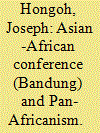

|
|
|
|
|
| Summary/Abstract |
The 1955 Asian-African Conference (Bandung) has been hailed as a turning point in the emergence of the Global South solidarity movement and a pivotal moment in southerners’ collective quest both to liberate themselves from colonialism and to reforge the international order on more inclusive and emancipatory foundations. In this article, the author demonstrates how, in Africa, these aspirations were undermined by nationalist ambitions that privileged self-contained sovereign statehood over potentially more progressive continental solidarity under the Pan-African spirit. The author does so by analysing how the absorption of the Bandung spirit within the Pan-African movement reinforced opportunities for the pursuit of national interests, the affirmation of colonial geographies and economies, and the intensification of forms of solidarities built on the imagined fruits of independence at the expense of a shared history of colonialism. For many African countries, the enduring lessons of the Bandung spirit reside in the challenges of resolving the tensions over the appropriate context for pursuing self-determination and transforming the international order. Thus, while the Bandung spirit delivered the means for newly independent states to engage in international politics through interstate solidarities, it also helped to accelerate the foreclosure of alternative possibilities for intervening in and reshaping the prevailing international order.
|
|
|
|
|
|
|
|
|
|
|
|
|
|
|
|
| 2 |
ID:
145524
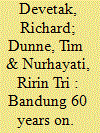

|
|
|
|
|
| Summary/Abstract |
This article examines the extent to which international society has been able to accommodate challenges such as the mid twentieth-century ‘revolt against the West’ and the twenty-first-century rise of new (especially non-Western) great powers. The Bandung conference of 1955 has commonly been seen as posing a threat to the fabric of international society by proliferating cultural and political differences. The authors show, on the contrary, that the political project of anti-colonialism and peaceful coexistence expressed at Bandung was actually consistent with a pluralist conception of international society, even if Western powers and intellectuals at the time failed to notice. The non-Western countries represented at Bandung were intent on expunging international society of the structures and practices of racism and colonialism so as to strengthen the foundations of a pluralistic international society better able to accommodate cultural and political differences.
|
|
|
|
|
|
|
|
|
|
|
|
|
|
|
|
| 3 |
ID:
145526
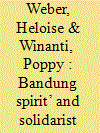

|
|
|
|
|
| Summary/Abstract |
It must come as no surprise that traces of any continuing relevance of the ‘Bandung spirit’ are enthusiastically being sought in the wake of the sixtieth anniversary of the Asian-African Conference. It was the first high-profile formal conference of newly independent (or ‘about-to-be independent’) post-colonial states at a rather momentous historical conjuncture: the continuing struggles for decolonisation were pronounced in the context of the Cold War. The Final Communiqué of the Bandung conference strongly articulated a collective political project against colonialism and imperialism, and for self-determination and racial equality, while already laying the foundations for the idea of strategic non-alignment in the context of the Cold War. It is in this sense that the Bandung conference has come to be emblematic of an event that inaugurated a radically different international political landscape to the immediate post-1945 world order. In this article, the authors focus specifically on the development aspirations articulated at the Asian-African Conference in Bandung, which they argue are the site of struggles and contradictions. As the authors show, the ‘Bandung spirit’ underlined the political project of Third Worldism, as well as the call for a new international economic order in the 1970s. Yet, they also identify some constraints and contradictions that the ‘Bandung spirit’ had to navigate and the challenges it was up against. In the final part of the article, the authors briefly discuss the extent to which the ‘Bandung spirit’ continues to resonate in contemporary global politics of development.
|
|
|
|
|
|
|
|
|
|
|
|
|
|
|
|
| 4 |
ID:
145522
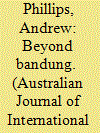

|
|
|
|
|
| Summary/Abstract |
The special issue this article opens examines the systemic impact, limits, achievements and legacies of the 1955 Asian-African ‘Bandung’ Conference. The Bandung conference is typically celebrated as a high point of Indonesian foreign policy activism and a key milestone in the emergence of the ‘Third World’. By contrast, mainstream international relations has paid comparatively less attention to its broader impact in the evolution of the modern international order. The special issue contributors here seek to correct this lacuna by interrogating Bandung’s significance in challenging, affirming and amending key aspects of the post-war global order. They also consider its relevance in setting important precedents that simultaneously foreclosed and enabled different manifestations of South–South cooperation thereafter. Beyond its historical significance, they finally explore Bandung’s enduring legacies for both domestic Indonesian order-building projects and Indo-Australian efforts to bridge the ‘Bandung divide’ in their responses to contemporary threats to international order. This article opens this inquiry by historically situating Bandung within its broader global context, unpacking its four ‘faces’ (order-challenging, order-affirming, order-building and order-transforming) and finally delineating the key axes of debate around which this special issue is organised.
|
|
|
|
|
|
|
|
|
|
|
|
|
|
|
|
| 5 |
ID:
145528
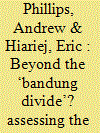

|
|
|
|
|
| Summary/Abstract |
Despite sharing many strategic interests, Indonesia and Australia have often struggled to forge effective security cooperation. In this article, the authors evaluate the ‘Bandung divide’ as a potential explanation for this difficulty. The ‘Bandung divide’ refers to the legacies of the 1955 Asian-African Conference, which saw Indonesia and Australia adopt different normative orientations towards the liberal international order, and divergent security strategies for South-East Asia. Having sketched the contours of the ‘Bandung divide’ and established its heuristic utility as a shorthand for the two countries’ divergent approaches to international order and regional security, the authors then evaluate its contemporary significance as a barrier to bilateral security cooperation in relation to two key challenges: Chinese revisionism in the South China Sea and transnational jihadist terrorism. Indonesia and Australia’s divergent approaches to regional security—themselves partially legacies of the ‘Bandung divide’—have prevented meaningful bilateral collaboration in engaging the South China Sea dispute. By contrast, the two countries have built an effective and heavily institutionalised counterterrorism partnership, proving that the ‘Bandung divide’ is not an insuperable barrier to cooperation. The highly restrictive circumstances that made this success possible nevertheless caution against unduly optimistic assumptions that the two countries will be able to forge a more comprehensive security partnership in the foreseeable future.
|
|
|
|
|
|
|
|
|
|
|
|
|
|
|
|
| 6 |
ID:
145527
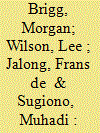

|
|
|
|
|
| Summary/Abstract |
Indonesia's normative leadership at the 1955 Asian-African Conference was grounded in anti-colonialism that became part of the ‘Bandung spirit’. However, the shape of Indonesia's recent leadership, following its remarkable democratisation, is harder to fathom. In response, this article suggests that Indonesia's regional and international engagements can be usefully understood through the lens of shifting domestic efforts to navigate unity with diversity, including as this is reflected in long-standing foreign policy commitments. Empirical reference points include the management of conflict in the Indonesian democratic transition, the place of civilian militias in Indonesian political life, and the Bali Democracy Forum. The case is made that Indonesia exhibits a remarkable embrace of diversity alongside substantial illiberality—a pattern that generates a flexible form of liberalism which presents difficulties, but also suggests particular opportunities for Indonesian leadership. Considering Indonesian navigation of unity with diversity enables a better understanding of the current and potential future shape of Indonesian leadership than analyses that rely on macro-level expectations of democratisation drawn from dominant liberal understandings of democracy and political order. This is in part because of the continuing salience of commitments to diversity, independence and cooperation that were articulated at Bandung in 1955.
|
|
|
|
|
|
|
|
|
|
|
|
|
|
|
|
| 7 |
ID:
145523
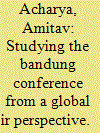

|
|
|
|
|
| Summary/Abstract |
Mainstream international relations scholarship has ignored or disparaged the significance and legacies of the Bandung conference. The author argues in favour of its importance, not only for any serious investigation into the evolution of the post-war international order, but also for the development of Global IR as a truly universal discipline: a global international relations. Few events offer more fertile ground for rethinking the established boundaries of international relations. After introducing the concept of a global international relations, the author then considers ways in which the conference’s key legacies challenge conventional accounts and attest to the ‘agency’ of the newly independent states in the making of the post-war international order. The legacies this section focuses on include frustration at Western attempts to ‘sabotage’ the conference; the delegitimisation of collective defence pacts and the development of the Non-Aligned Movement; the emergence of a South-East Asian regionalism; the strengthening of emergent global norms affirming decolonisation, human rights, universalism and the United Nations; and support for the ‘comity’, over the ‘clash’, of civilisations. The author also canvasses negative legacies of the conference, including the polarisation of Asia and the encouragement of authoritarian tendencies and regional interventionist impulses. The author concludes by drawing implications of the conference for the study of global international relations.
|
|
|
|
|
|
|
|
|
|
|
|
|
|
|
|
|
|
|
|
|